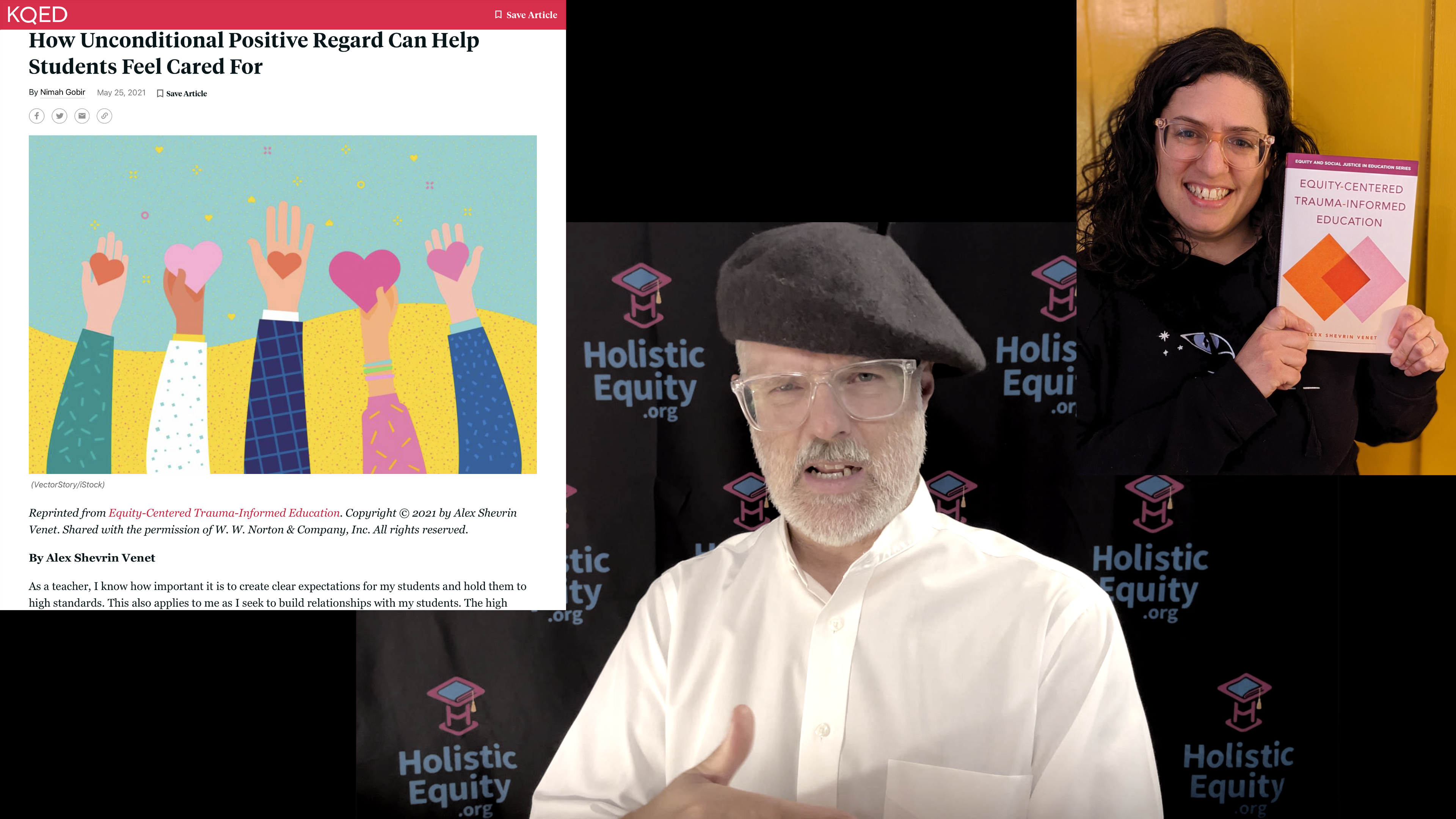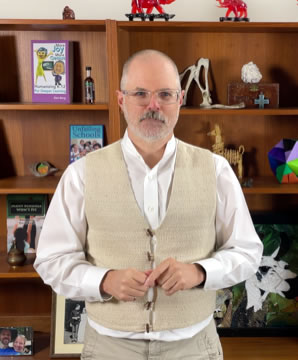Unconditional Positive Regard Is Good For Children- Education Hygiene Ep#3
Unconditional positive regard.
Some might wonder if it is merely fancy jargon for permissiveness.
Stick around to find out why it is NOT.
Welcome to the Education Hygiene Series in which I will be explaining the specific teacher behaviors that scientists have found influence student motivation for better … and for worse.
Episode Links:
Series Links:
Survey- Teachers’ Effects on Student Motivation
Newsletter- Holistic Equity
Intro to Education Hygiene
Hygiene Items: Ahmadi, A., Noetel, M., Parker, P. D., Ryan, R., Ntoumanis, N., Reeve, J., ... Lonsdale, C. (2022, February 4). A Classification System for Teachers’ Motivational Behaviours Recommended in Self-Determination Theory Interventions. https:// doi.org/10.31234/osf.io/4vrym
In today’s episode we are talking about positive regard.
In the consensus paper from motivation psychologists there are two items that mention positive regard but they are opposites.
Conditional … bad.
Unconditional positive regard … good.
But let’s be clear about what those two modes of providing positive regard mean.

Unconditional Positive Regard is not Permissiveness
Conditional means I will only regard you positively IF you do some particular thing that I want you to do.
The opposite is that I will regard you positively, no matter what you do.
This unconditional bit gets some people into a tizzy because they fear that this would encourage teachers to be permissive, which is a notoriously bad idea.
Recognize that there is a legitimate concern behind the alarm that the phrase “unconditional positive regard” elicits.
But also understand that it only arises in folks who do not realize that regarding a person in a positive manner unconditionally is not the same as permissiveness which is when you have weak or non-existent boundaries about behavior.
I remember taking a Virtues Project workshop back in the 90s.
Dr. Dan Popov, co-author of the Family Virtues Guide, told a story about how child therapists first tried out the notion of unconditional positive regard.
The kids would come into the therapy session and, being troubled children, do all sorts of crazy stuff to figure out what boundaries mattered in that situation.
Now, all kids will test the boundaries in one way or another eventually, but kids needing mental health interventions are often going to get down to it sooner, rather than later, and with gusto.
So, after witnessing lots of property damage, and coming to some small degree of harm, the therapists realized that they needed to make the distinction between unconditionally regarding THE CHILD positively and setting clear boundaries for acceptable behavior.
They figured out that conditionally regarding the child’s behavior according to how well it fit within the therapist’s boundaries was important.
As was UNconditionally regarding the child, independent of their behaviors.
In short, unconditional positive regard is about regard for a child’s identity, not their behavior.
The challenge is to regard their behavior with clear boundary conditions, but at the same time regard their identity without conditions.
Boundaries on identity are harmful to children, but boundaries on behavior are healthy.
Last year Alex Shevrin Venet wrote an article about how she used unconditional positive regard in her teaching and about observations she later made in her consulting work.
She was sometimes surprised to see teachers that seemed to practice teaching as a series of shallow transactions with students rather than practicing teaching as a context for relationships that need to be given time and effort to develop and deepen.
From the perspective of psychology I am clear that if teachers are managed like knowledge delivering robots and students as knowledge receiving receptacles, it should not be a shock that they might start acting according to how they are being treated.
When schools force teachers to cover material at an arbitrarily fast pace for large masses of students then those teachers and students are being encouraged to act like their relationships are made up of an endless series of shallow delivery transactions.
What would be surprising is if they acted any other way.
[long pause]
Returning to the theme of permissiveness, since I am well-known as an advocate for what was previously known as “free schools” I feel compelled to address their reputation for being permissive institutions.
A.S. Neill’s Summerhill school in England was so deeply burned by that reputation he had to write a book called Freedom, Not License.
Let’s get clear about the point in his title.
A license grants permission for some kind of activity.
For instance, a driver’s license gives you permission to operate a motor vehicle.
Whereas, freedom is the opportunity to act without permission.
There are no state regulations or other laws about how you maintain the vehicle you are licensed to drive.
In fact, you could interpret that lack of regulation to imply that you therefore are completely free to maintain your vehicle in any way you see fit.
If we lived under a permissive state system then that might be a reasonable interpretation.
However, we live in a type of state that explicitly supports freedom AND explicitly does not grant citizens license to do any of the infinite possible activities that are not specifically regulated by the state.
You don’t get to act in ways that could harm others.
In my home state of Oregon in 2016 a driver took the liberty of neglecting the maintenance of the tires on his Toyota 4Runner to the point that on a rainy day as he was crossing the St. Johns Bridge he fatally struck a bicyclist.
He was sentenced to three and a half years in prison for his negligence.
We, here in state of Oregon, did not subsequently pass new laws to regulate tire maintenance, because we do not aspire to authoritarianism.
But as demonstrated by the prison sentence, neither is Oregon a permissive state.
Just because I experience the freedom to undertake a potentially infinite array of possible activities does not mean that I, therefore, have a license to interfere with anybody else.
What is not immediately evident when we talk about freedom is that there are many aspects of our lives in which our freedoms overlap with the freedoms of others.
As a practical matter we operate on the principle that your rights end where mine begin and vice versa.
Since we don’t live in a permissive state, we are constantly negotiating where that line is drawn.
The negotiations of that line are the whole reason behind the active and necessary debates about environmental protection, vaccinations, etc.
In their perpetual fights against state regulation, the libertarians on the political right and the anarchists on the political left both seem to be unclear on the practicality of this point.
They don’t seem to realize that a permissive state would be bad for everyone.
Back to the topic of schools, as someone who has spent some time in and made some study of the democratic school movement, formerly known as the free school movement, I can tell you that there were probably some schools in the movement that were permissive.
However, any democratic school that has lasted more than about 10 years has done so because either it was never permissive or it eventually figured out how to have healthy boundaries.
In order to survive they have all had to arrive at some way of facilitating freedom, not license.
But this video is about positive regard and the two modes in which teachers can practice it. Notice that the magnitude of effect is not only the opposite but also the same magnitude in each direction.
The consensus paper that these were presented in only had median effect sizes that ranged from 2, on the positive side, down to negative 3.
So, the valence of this one thing, how you positively regard your students, makes a whopping four- out of a possible five-point difference to the motivation of your students.
If you are interested in delving deeper into the research on this topic, the Self-Determination Theory website has a whole section devoted to studies of positive regard.
Outro-
I will share a link to that page underneath this video at Holistic Equity DOT org where you can also get deeper dives into many other school reform topics.
I invite you to share your thoughts by clicking on the Contact link.
You can also find out about my book Schooling for Holistic Equity: How to Manage the Hidden Curriculum in K-12.
Finally, you can find out how much you already know about Teachers' Effects on Student Motivation because I created a survey where you can compare what scientists have found to your knowledge of motivation.
Thanks for watching.
This article was printed from HolisticEquity.com




